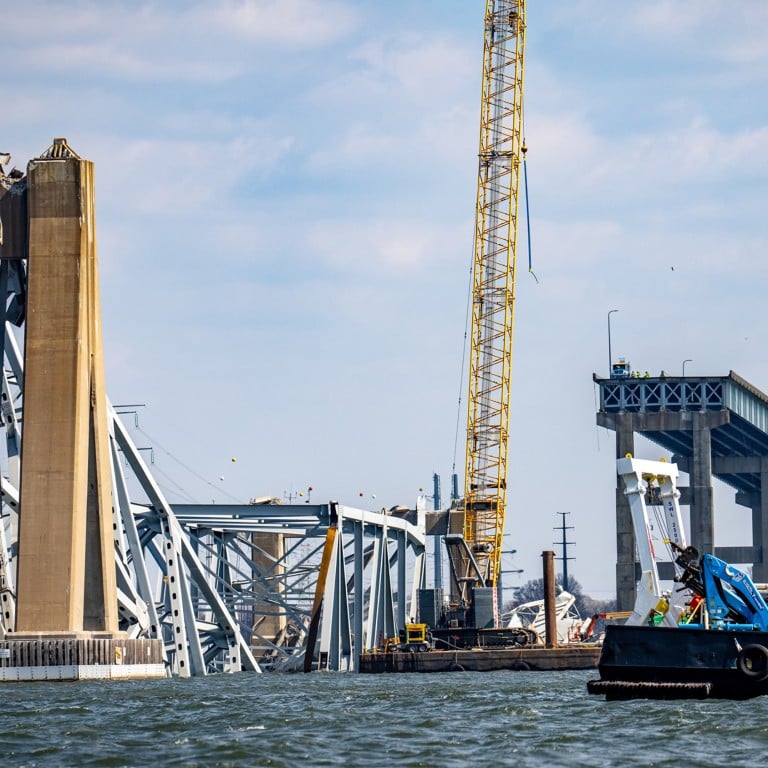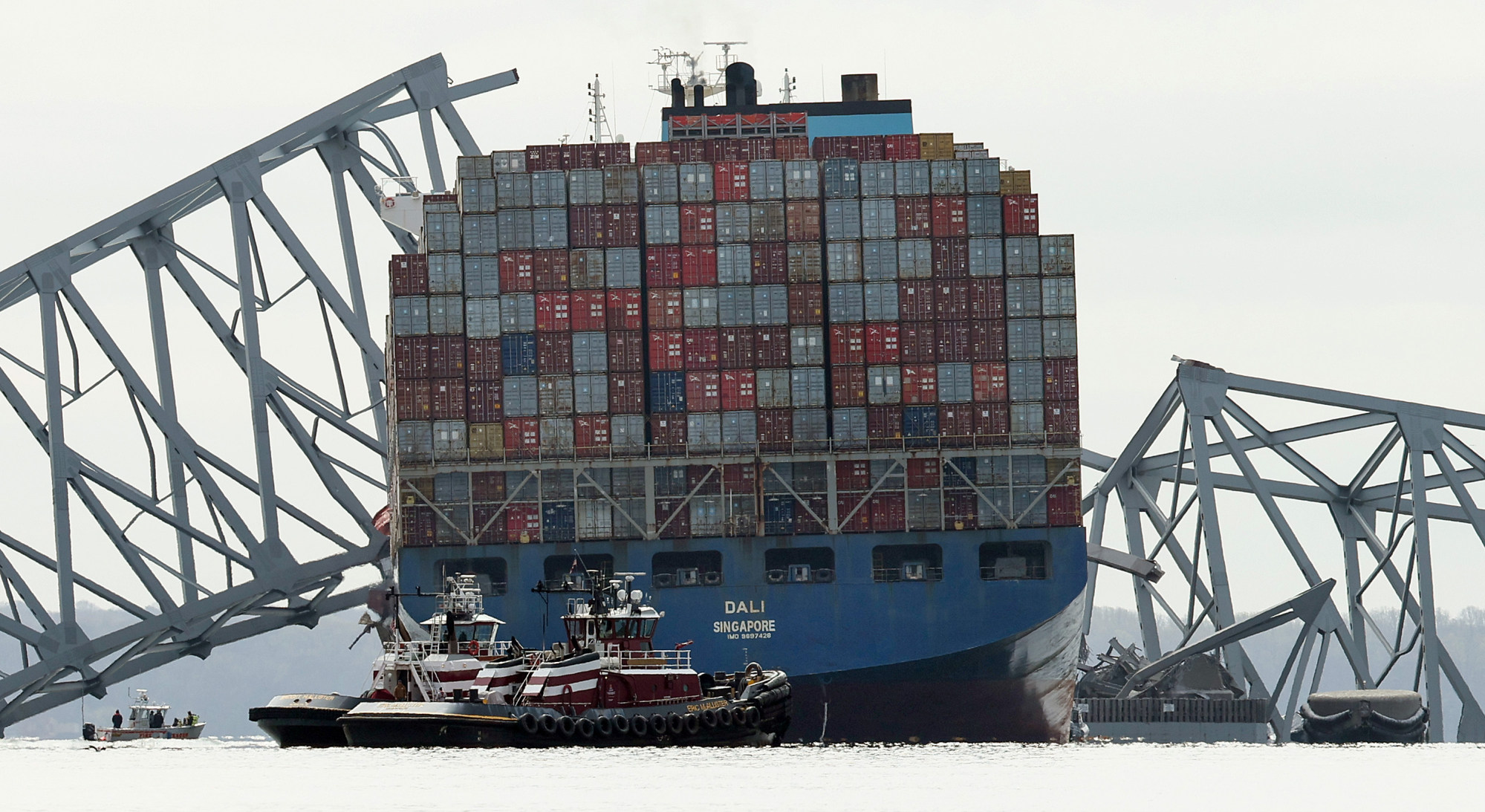
After Baltimore bridge collapse, unfounded conspiracy theories include a role for China
- Posts that cite Beijing as a possible suspect reflect rising alarm about China in the US and recent statements by Washington officials, analysts say
- ‘The increasing anti-China rhetoric in the US has contributed to the conspiracy theories that Chinese cyberattacks caused the bridge collapse,‘ one contends
By the time daylight last Tuesday revealed the twisted remains of the Francis Scott Key bridge blocking the Port of Baltimore and analysts began assessing the disruption and economic damage it would cause, conspiracy theories were already flooding US social media.
China emerged as one among many supposed culprits – along with other alleged causes discussed in right-wing media bubbles like unchecked immigration and “diversity, equity and inclusion” (DEI) mandates – in the hours and days after the disaster that killed six people.
What set the China angle apart from other speculation was the context of starkly negative public opinion about China in America; dire US assessments about the ways Beijing allegedly seeks to exploit vulnerabilities in the country’s national security; and Washington actions taken to counter them.
The collapse occurred just a day after both Britain and the US newly accused China of cyberespionage and stealing the data of millions of Americans including lawmakers, academics and journalists.
Crews work to lift first piece of Baltimore bridge in ‘complex operation’
With US-China relations remaining tense, Beijing was a suspect online, with several social media users citing repeated warnings by US government officials against possible cyberattacks on American infrastructure.
In many cases, the posts used these warnings as a foundation for their claims.
“With the shipping event in Baltimore, it seems important to remember very recent news about cyber vulnerabilities at our ports”, wrote Brian Costello, a data security expert with nearly 18,000 followers on X, formerly known as Twitter.
Costello noted that 80 per cent “of ship-to-shore cranes facilitating trade at US ports are manufactured in China and operate using Chinese software”.
ShanghaiPanda, an X account with more than 80,000 followers, poked fun at the allegations by assembling a video featuring some of the more outlandish claims, including one from Robert Spalding, identified as a retired general and a former China strategist for the chairman of the Joint Chiefs of Staff and the Joint Staff at the Pentagon.
In that post, Spalding asks “Chinese container ship?” above footage of the bridge falling onto the colliding vessel, the Dali, which is actually owned by a Singaporean company.
All these claims were entirely unfounded. Baltimore Police Commissioner Richard Worley has ruled out “any indication that the incident was intentional” and the FBI issued a statement on the day of the collapse saying that there was “no specific and credible information to suggest any ties to terrorism”.
Analysts said the speculation and rumours, though, came as a reminder of the side effects of the increasingly negative portrayal of China in the US, indicative of the general decline in the health of American media ecosystem and political discourse.
According to a November 2023 survey by the Chicago Council on Global Affairs, around 58 per cent of Americans now view China’s rise as a threat to the US.
“When faced with shocking events, people tend to blame what they see as a common enemy”, observed Caitlin Chin-Rothmann, who researches the impact of technology on geopolitics and society at the Centre for Strategic and International Studies in Washington.
US must bolster its shipbuilding ports as China keeps strengthening: analysts
“The increasing anti-China rhetoric in the US has contributed to the conspiracy theories that Chinese cyberattacks caused the bridge collapse” because some “politicians and media commentators have used inflammatory or oversimplified language to describe China in the past,” she said.
Chin-Rothmann warned that widespread prevalence of conspiracy theories could result in “misinformation fatigue”, eroding the public’s ability to trust the information they see online, whether factual or fake.
“For this reason, if cyberattacks do target US critical infrastructure in the future – whether linked to China or not – it will become increasingly difficult for governments to coordinate cohesive responses among the public,” she added.
Bill Drexel, a technology and national security programme fellow at the Centre for a New American Security in Washington, said that linking China to the Baltimore bridge collapse was “corrosive to public trust and a dangerous distraction from focusing on Beijing’s very real malicious activities on American soil – totally counterproductive on both counts”.
Liu Pengyu, a spokesperson for the Chinese embassy in Washington, condemned the speculations of Beijing’s involvement as “purely malicious slander”. He added that China was ready to work with the US to “faithfully implement the important common understandings and outcomes reached at the summit meeting and jointly develop a right perception”.

Other recent measures by the US government in response to perceived threats from China include US President Joe Biden’s executive order on US port cybersecurity banning Chinese-manufactured shipping cranes.
In January, FBI Director Christopher Wray warned about the growing threat of Chinese cyberattacks on US electrical grids and other infrastructure systems.
“China’s hackers are positioning on American infrastructure in preparation to wreak havoc and cause real-world harm to American citizens and communities, if or when China decides the time has come to strike”, he told a congressional panel.
The port of Baltimore is the ninth-largest in the US by total exports and imports. Last year, it handled 52.3 million tons of foreign cargo worth nearly $81 billion – mostly moving cars, auto parts, construction machinery and coal.
“I think an overly negative perception of China can make it difficult for people to differentiate facts from fiction,” Drexel said.
“But by the same token, a naivete or overly optimistic perception of the CCP can equally make it difficult for folks to differentiate facts from fiction.”

